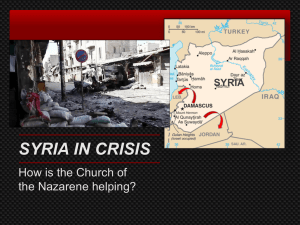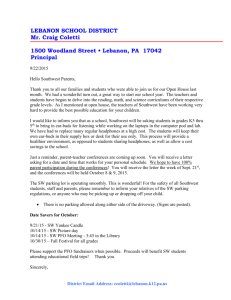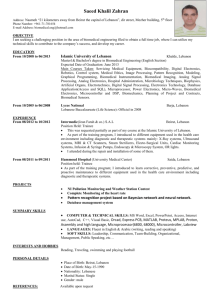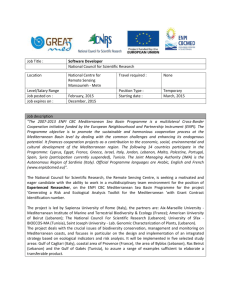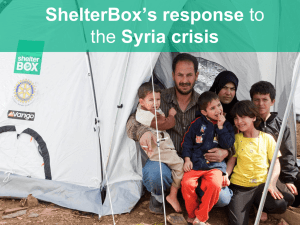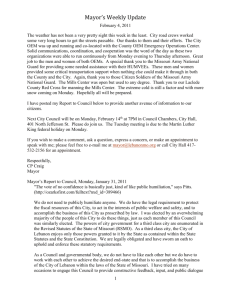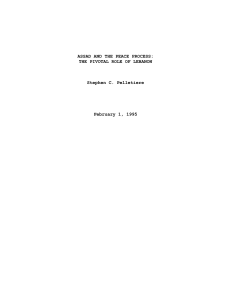Delegate: Jerome Bermudez and Shanoah King
advertisement
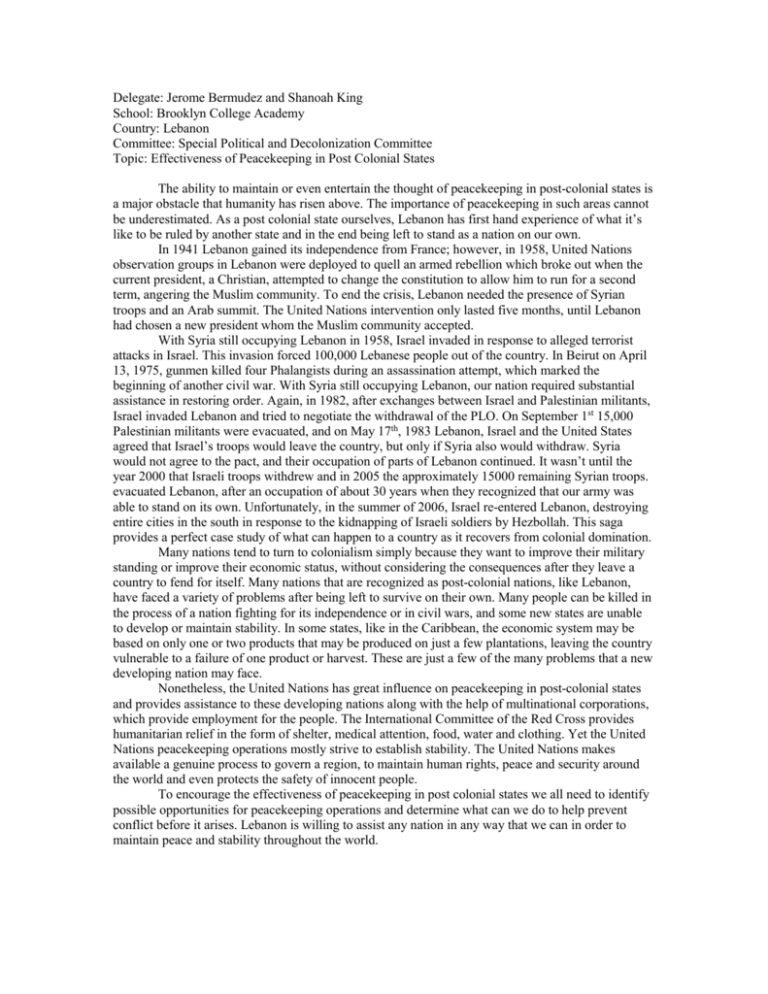
Delegate: Jerome Bermudez and Shanoah King School: Brooklyn College Academy Country: Lebanon Committee: Special Political and Decolonization Committee Topic: Effectiveness of Peacekeeping in Post Colonial States The ability to maintain or even entertain the thought of peacekeeping in post-colonial states is a major obstacle that humanity has risen above. The importance of peacekeeping in such areas cannot be underestimated. As a post colonial state ourselves, Lebanon has first hand experience of what it’s like to be ruled by another state and in the end being left to stand as a nation on our own. In 1941 Lebanon gained its independence from France; however, in 1958, United Nations observation groups in Lebanon were deployed to quell an armed rebellion which broke out when the current president, a Christian, attempted to change the constitution to allow him to run for a second term, angering the Muslim community. To end the crisis, Lebanon needed the presence of Syrian troops and an Arab summit. The United Nations intervention only lasted five months, until Lebanon had chosen a new president whom the Muslim community accepted. With Syria still occupying Lebanon in 1958, Israel invaded in response to alleged terrorist attacks in Israel. This invasion forced 100,000 Lebanese people out of the country. In Beirut on April 13, 1975, gunmen killed four Phalangists during an assassination attempt, which marked the beginning of another civil war. With Syria still occupying Lebanon, our nation required substantial assistance in restoring order. Again, in 1982, after exchanges between Israel and Palestinian militants, Israel invaded Lebanon and tried to negotiate the withdrawal of the PLO. On September 1st 15,000 Palestinian militants were evacuated, and on May 17th, 1983 Lebanon, Israel and the United States agreed that Israel’s troops would leave the country, but only if Syria also would withdraw. Syria would not agree to the pact, and their occupation of parts of Lebanon continued. It wasn’t until the year 2000 that Israeli troops withdrew and in 2005 the approximately 15000 remaining Syrian troops. evacuated Lebanon, after an occupation of about 30 years when they recognized that our army was able to stand on its own. Unfortunately, in the summer of 2006, Israel re-entered Lebanon, destroying entire cities in the south in response to the kidnapping of Israeli soldiers by Hezbollah. This saga provides a perfect case study of what can happen to a country as it recovers from colonial domination. Many nations tend to turn to colonialism simply because they want to improve their military standing or improve their economic status, without considering the consequences after they leave a country to fend for itself. Many nations that are recognized as post-colonial nations, like Lebanon, have faced a variety of problems after being left to survive on their own. Many people can be killed in the process of a nation fighting for its independence or in civil wars, and some new states are unable to develop or maintain stability. In some states, like in the Caribbean, the economic system may be based on only one or two products that may be produced on just a few plantations, leaving the country vulnerable to a failure of one product or harvest. These are just a few of the many problems that a new developing nation may face. Nonetheless, the United Nations has great influence on peacekeeping in post-colonial states and provides assistance to these developing nations along with the help of multinational corporations, which provide employment for the people. The International Committee of the Red Cross provides humanitarian relief in the form of shelter, medical attention, food, water and clothing. Yet the United Nations peacekeeping operations mostly strive to establish stability. The United Nations makes available a genuine process to govern a region, to maintain human rights, peace and security around the world and even protects the safety of innocent people. To encourage the effectiveness of peacekeeping in post colonial states we all need to identify possible opportunities for peacekeeping operations and determine what can we do to help prevent conflict before it arises. Lebanon is willing to assist any nation in any way that we can in order to maintain peace and stability throughout the world.


